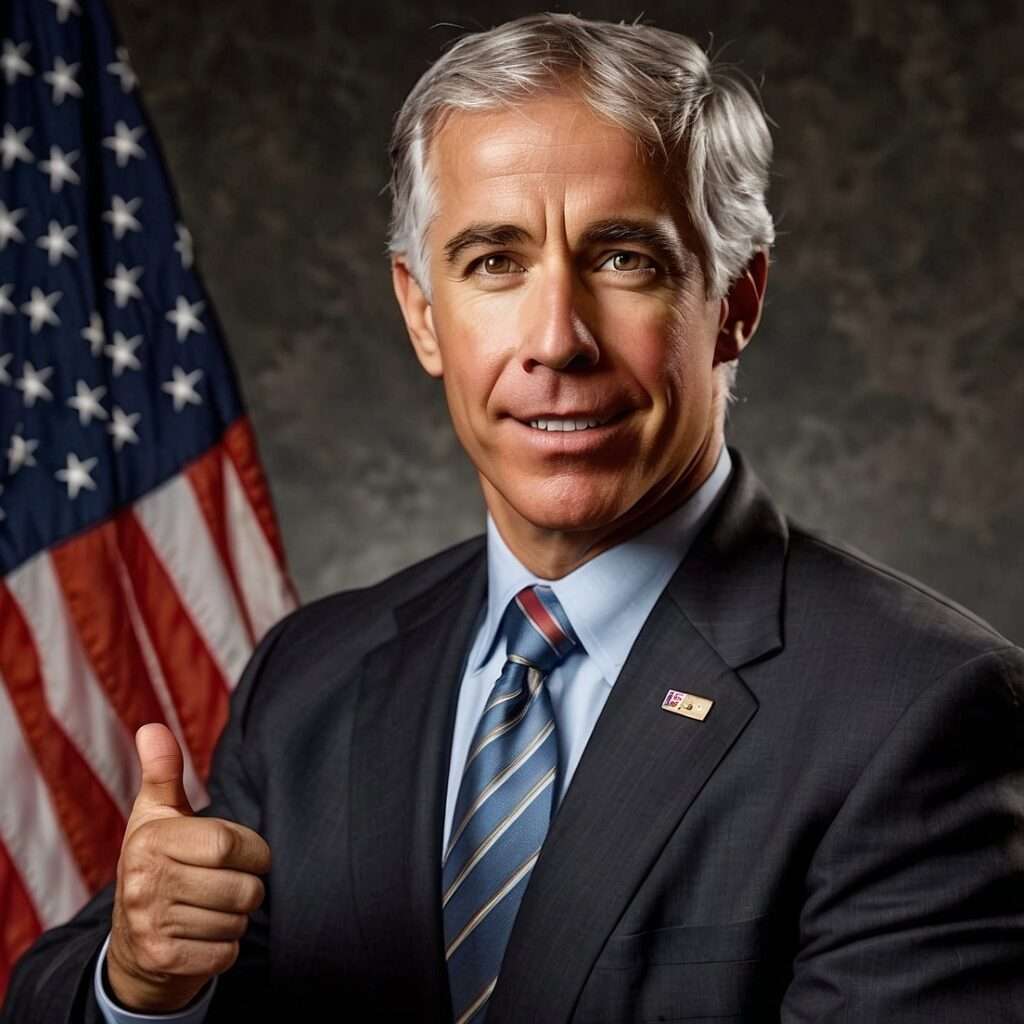
Chris Wright, nominee for Secretary of Energy, photographed in front of the American flag, symbolizing confidence and leadership in the U.S. energy sector.
Introduction: Chris Wright’s Vision for U.S. Energy
Chris Wright, CEO of Liberty Energy and a prominent figure in the energy sector, is a pivotal nominee for Secretary of Energy. With his extensive background in hydraulic fracturing and steadfast advocacy for fossil fuels, Wright represents a significant shift toward traditional energy policies. However, his nomination has sparked intense debate about the future of U.S. energy policy, especially concerning renewable energy and climate change.
This analysis explores Chris Wright’s qualifications, his potential policies, and the controversies surrounding his nomination to determine whether he is a suitable choice for this influential role.
Who Is Chris Wright? Background of the Secretary of Energy Nominee
Liberty Energy Leadership
Chris Wright is the CEO of Liberty Energy, North America’s second-largest hydraulic fracturing company. The firm specializes in innovative approaches to oil and gas extraction, emphasizing efficiency and technological advancement. Under Wright’s leadership, Liberty Energy has cemented itself as a major player in the fossil fuel industry.
Expertise in Energy Markets
Wright’s technical knowledge of energy production is widely respected. He is credited with introducing cost-effective and environmentally conscious fracking methods, showcasing his ability to address engineering challenges while meeting market demands. His understanding of the complexities of the energy market positions him as a knowledgeable and pragmatic leader.
Advocacy for Fossil Fuels
Wright consistently frames hydrocarbons as essential to global prosperity. He emphasizes the vital role oil and gas play in improving living standards, particularly in developing nations with limited access to reliable energy.
“Hydrocarbons are not just energy—they’re a foundation for human well-being,” Wright stated during an industry panel.
His nomination aligns with former President Donald Trump’s energy priorities, including deregulation and maximizing domestic energy production.
Potential Impact of Chris Wright Secretary of Energy Policies
Championing Fossil Fuels
As Secretary of Energy, Wright is expected to advocate for policies that expand oil and gas production while reducing regulatory barriers. Key outcomes could include:
- Strengthened Energy Independence
By increasing domestic production, Wright’s policies could reduce reliance on foreign energy imports, bolstering national security and economic resilience. - Job Creation and Economic Growth
Encouraging investment in fossil fuel infrastructure may generate thousands of jobs, particularly in energy-rich states like Texas and North Dakota. - Energy Affordability
Higher domestic production could lower energy costs for American households and industries, providing economic relief during periods of global instability.
Challenges with Renewable Energy
Wright’s focus on fossil fuels may complicate efforts to balance traditional energy policies with renewable energy initiatives. Critics point to several challenges:
- Delaying the Transition: Prioritizing oil and gas risks slowing down the adoption of renewable technologies, potentially leaving the U.S. behind in the global clean energy race.
- Environmental Costs: Increased fossil fuel reliance could exacerbate greenhouse gas emissions and land degradation, undermining global climate goals.
- Public Perception: Younger, environmentally conscious voters may view his policies as outdated, potentially sparking political backlash.
“Balancing traditional energy with renewables will test Wright’s ability to lead inclusively in a polarized energy landscape,” notes one energy analyst.
Challenges and Controversies Surrounding Chris Wright Secretary of Energy
Ties to the Fossil Fuel Industry
Wright’s deep connections to the fossil fuel sector have drawn criticism from environmental groups, who argue his leadership could disproportionately favor oil and gas interests over clean energy innovation.
- Conflict of Interest
Critics claim Wright’s role as CEO of Liberty Energy could undermine impartiality in federal energy policies, prioritizing private sector interests. - Undermining Climate Goals
Environmentalists contend that appointing someone so entrenched in fossil fuel production risks derailing progress toward reducing carbon emissions.
“Chris Wright’s background makes him more of an industry advocate than a public servant committed to sustainability,” states one environmental group report.
Skepticism Toward Climate Change
Wright has publicly expressed doubts about the urgency of climate change, instead emphasizing the economic benefits of fossil fuels.
- Focus on Economics Over Environment
Wright argues that energy affordability and accessibility should take precedence over aggressive decarbonization efforts. - Potential Policy Outcomes
Critics worry that his reluctance to prioritize climate action could lead to reduced funding for renewable energy research and development, delaying advancements in solar, wind, and battery technologies.
“At a time when the world is racing to address climate change, Wright’s policies could put the U.S. at odds with international climate commitments,” warns an environmental policy expert.
What Supporters Say About Chris Wright as Secretary of Energy
Fossil Fuel Advocacy in Chris Wright Secretary of Energy Policies
Supporters emphasize Wright’s extensive expertise in energy markets and his ability to streamline fossil fuel production for maximum efficiency. His leadership style is consistently praised as pragmatic, results-oriented, and grounded in the realities of the current energy landscape.
- Proven Track Record: At Liberty Energy, Wright spearheaded the adoption of innovative technologies that significantly increased efficiency in oil and gas extraction while lowering operational costs. These advancements have positioned Liberty Energy as a leader in the sector.
- Energy Independence: Advocates highlight how Wright’s approach aligns with America’s goal of achieving energy independence. By prioritizing domestic energy production, Wright’s policies could reduce reliance on volatile foreign energy sources, strengthening national security.
“Chris Wright is uniquely positioned to lead the Department of Energy with a focus on strengthening America’s energy independence,” noted an energy analyst.
Economic Focus: Driving Growth Through Energy Policies
Wright’s supporters argue that his policies would invigorate the U.S. energy sector by creating jobs, attracting investment, and driving overall economic growth. They view him as a leader capable of leveraging traditional energy resources to support long-term prosperity.
- Job Creation: Proponents believe Wright’s emphasis on expanding infrastructure for fossil fuel extraction could generate thousands of high-paying jobs, especially in energy-reliant states like Texas, Oklahoma, and North Dakota. These opportunities could uplift regional economies and support middle-class families.
- Economic Growth: By reducing regulatory barriers, Wright’s policies could encourage innovation and investment in fossil fuel technologies. This deregulated environment could enhance the global competitiveness of U.S. energy exports, particularly as developing nations continue to demand affordable hydrocarbons.
“Wright understands the importance of reliable energy to America’s economy,” said an industry executive.
Balancing Renewable Energy Goals with Chris Wright’s Approach
Supporters describe Wright as a pragmatist who acknowledges the importance of renewable energy while emphasizing the critical role fossil fuels play in maintaining energy stability. They argue that a balanced approach, prioritizing both reliability and gradual transition, is essential to avoid economic and energy crises.
- Realistic Perspective: Wright’s supporters contend that his approach to energy policy is grounded in reality, not ideology. They believe his emphasis on fossil fuels reflects an understanding of the current limitations of renewable technologies and their inability to fully replace hydrocarbons in the near term.
- Complementary Strategies: While renewable energy expansion is vital, proponents of Wright’s policies argue that traditional energy sources must remain part of the mix to ensure grid reliability and affordability during the transition.
“Wright is not anti-renewable; he’s pro-reality,” remarked a supporter. “You can’t power an economy on ideology alone.”
Concluding Reflections
The Chris Wright Secretary of Energy analysis presents a nominee with significant expertise in traditional energy production and the potential to drive economic growth. However, his strong ties to fossil fuels and skepticism about climate action make him a polarizing figure.
Strengths
- Industry Expertise: Wright’s technical knowledge positions him as a strong advocate for U.S. energy independence.
- Economic Benefits: His policies could create jobs and boost economic growth.
Challenges
- Environmental Concerns: Critics warn that Wright’s focus on fossil fuels may delay the energy transition.
- Public Perception: His nomination has drawn criticism from environmental groups and climate advocates.
Ultimately, Wright’s ability to balance fossil fuel advocacy with renewable energy innovation will define his legacy. His leadership will undoubtedly shape the future of U.S. energy policy for years to come.—it’s a test of how the U.S. balances pragmatism and progress during a pivotal energy revolution.
DARWIN’s Take: The Weight of Progress vs. Tradition
A Leader of Yesterday’s Energy or Tomorrow’s Vision?
Chris Wright’s nomination as Secretary of Energy captures the tension at the heart of America’s energy debate. On one hand, Wright is a master of the traditional energy world—a figure who understands the complexities of oil and gas production like few others. On the other hand, his views on climate urgency and renewable energy signal a potential resistance to the transformational shifts the world is demanding.
“In Wright, we see the paradox of energy leadership: a man perfectly suited to manage yesterday’s energy challenges but perhaps misaligned with the imperatives of tomorrow.”
Pragmatism vs. Progress: Can They Coexist?
The stakes of this nomination go beyond partisan divides. They touch on a deeper question: how does a nation balance pragmatism with progress? Wright’s fossil fuel expertise and focus on economic growth could help stabilize energy markets and create jobs in the short term. However, his policies risk entrenching fossil fuel dependency at a time when the world is racing toward cleaner alternatives.
For America, this isn’t just about energy independence or economic growth—it’s about positioning itself in a rapidly changing global energy market. Can Wright’s leadership bridge the gap between traditional energy security and a sustainable future? Or will his policies leave the U.S. clinging to a fading era of fossil fuel dominance while other nations surge ahead in renewables?
A Vision Beyond Fossil Fuels
“The Department of Energy doesn’t just manage resources—it defines the nation’s vision. Wright’s challenge isn’t just to lead—it’s to evolve.”
The real test will be whether Wright can expand his fossil fuel-focused expertise to embrace the complexities of a diverse energy portfolio. If he succeeds, his tenure could be a stabilizing force. If he fails, it may be a cautionary tale of how the U.S. missed a critical opportunity to lead in a global energy revolution.
“Wright’s success won’t be measured by oil production alone—it will be judged by whether he leads America into the energy future it needs, not the one it used to know.”
Chris Wright: A Reflection of America’s Energy Struggle
Chris Wright’s nomination isn’t just about one man. It’s a reflection of America’s ongoing struggle to reconcile energy pragmatism with climate urgency. His policies will shape not only how the U.S. manages its resources today but also its vision for a sustainable tomorrow. This balancing act will define the nation’s trajectory for decades to come.
Sources
Further Reading on Paranoid Prophet
- The National Divorce: Could Secession Solve America’s Deep Divides?
Explore how polarization impacts governance and public trust, offering insights into the challenges RFK Jr. would face as a reformer in public health. - Matt Gaetz Human Trafficking Allegations: Media Smear Campaign or Manufactured Scandal?
This article delves into the complexities of political scandals and media narratives, providing context on the challenges public figures like RFK Jr. may encounter in the public eye. - Trump’s Second-Term Cabinet Picks: The Team Shaping His New Administration
An analysis of the political dynamics and implications of cabinet appointments, offering insights into the environment RFK Jr. would navigate as a potential Health Secretary. - RFK Jr.: A Game-Changing Nominee for Secretary of Health and Human Services
A focused examination of RFK Jr.’s nomination, exploring the potential impact and controversie surrounding his appointment as Health Secretary.
External Sources for Further Reading
For a comprehensive understanding of Chris Wright’s nomination as Secretary of Energy, consider exploring the following articles:
- “Trump picks oil-industry CEO Chris Wright as energy secretary nominee”
This Reuters article provides an overview of Wright’s nomination, highlighting his background and the potential implications for U.S. energy policy. Reuters - “Trump’s Pick for Energy Secretary Fights Climate ‘Mania'”
Barron’s discusses Wright’s stance on climate change and his approach to energy policy, offering insights into his perspectives on fossil fuels and renewable energy. Barron’s - “Trump taps oil boss and fracking advocate Chris Wright as Secretary of Energy”
The New York Post examines Wright’s advocacy for hydraulic fracturing and his expected influence on the Department of Energy’s direction. New York Post - “What to know about Chris Wright, Trump’s choice to run the Energy Department”
The Associated Press provides a detailed profile of Wright, including his career trajectory and the controversies surrounding his nomination. Associated Press - “Trump’s Energy Pick Chris Wright Brings New Views On Climate Policy”
Forbes analyzes Wright’s unconventional perspectives on climate policy and how they might shape his tenure as Secretary of Energy. Forbes
FAQ Section for Chris Wright Secretary of Energy
Chris Wright’s Background and Policies
Q: Who is Chris Wright, and why is he nominated for Secretary of Energy?
A: Chris Wright is the CEO of Liberty Energy, a leading hydraulic fracturing company. He is known for his expertise in fossil fuel production and energy markets. Nominated by former President Donald Trump, Wright’s nomination signals a focus on traditional energy policies and deregulation.
Q: What are Chris Wright’s qualifications for Secretary of Energy?
A: Chris Wright’s qualifications include decades of experience in the energy industry, leadership of Liberty Energy, and expertise in hydraulic fracturing and energy markets. His supporters believe this makes him well-suited to manage U.S. energy policy.
Q: What is Chris Wright’s stance on renewable energy?
A: While Chris Wright acknowledges the importance of renewable energy, his policies heavily favor fossil fuel production. Critics argue that this emphasis could delay the transition to cleaner energy sources, but supporters claim it reflects a pragmatic approach to energy security and economic growth.
Q: How might Chris Wright’s nomination impact U.S. energy independence?
A: If confirmed, Wright is expected to prioritize domestic oil and gas production, reducing reliance on foreign energy imports. This could strengthen U.S. energy independence and create jobs in the traditional energy sector.
Challenges, Controversies, and Future Implications
Q: What controversies surround Chris Wright’s ties to the fossil fuel industry?
A: Environmental groups criticize Wright for his deep connections to the fossil fuel sector. As CEO of Liberty Energy, his policies could favor oil and gas interests over clean energy innovation, raising concerns about conflicts of interest and environmental impact.
Q: How does Chris Wright view climate change?
A: Chris Wright has expressed skepticism about the urgency of climate change, focusing instead on the economic benefits of fossil fuels. This perspective appeals to industry stakeholders but has drawn criticism from climate advocates.
Q: How will Chris Wright balance fossil fuel production with renewable energy goals?
A: Wright’s ability to balance these priorities remains a key question. While he strongly advocates for fossil fuels, it is unclear how much emphasis he will place on expanding renewable energy infrastructure or funding clean energy technologies.
Q: What are the potential benefits of Chris Wright’s nomination?
A: Supporters highlight the economic benefits, including job creation, increased investments in energy infrastructure, and strengthened energy independence. Wright’s technical knowledge may also help streamline energy policies.


